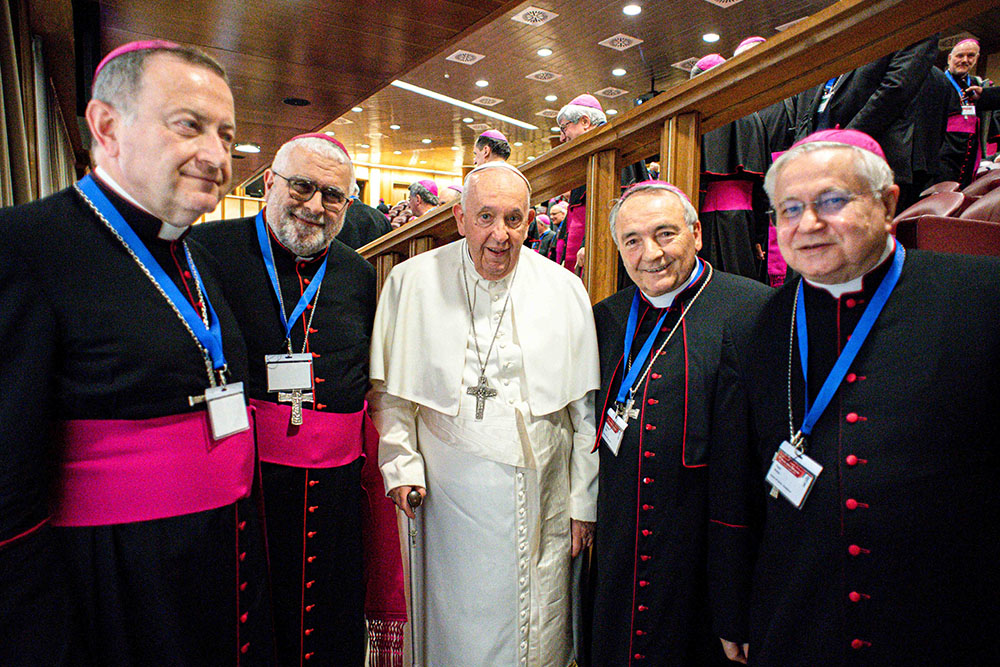
Pope Francis poses for a photo with bishops from the flooded areas of Emilia-Romagna, Italy, during the general assembly of the Italian bishops' conference at the Vatican May 22. From left are: Archbishop Lorenzo Ghizzoni of Ravenna-Cervia, Bishop Giovanni Mosciatti of Imola, Bishop Livio Corazza of Forlì-Bertinoro and Bishop Mario Toso of Faenza-Modigliana. (CNS/Vatican Media)
During the general assembly of the Italian bishops' conference, Pope Francis met with bishops whose dioceses have been hit by devastating floods and landslides.
At least 13 people have died and more than 36,000 people were left homeless after intense rainfall triggered flooding and landslides in the Italian region of Emilia-Romagna. More than 23,000 people had been evacuated, according to the Italian Civil Protection Department May 22.
More than 200 members of the Italian bishops' conference were meeting May 22-25 in the Vatican's Synod Hall, and the pope took time out of the scheduled talks to listen to the situation affecting the region when he met with Archbishop Lorenzo Ghizzoni of Ravenna-Cervia, Bishop Giovanni Mosciatti of Imola, Bishop Livio Corazza of Forlì-Bertinoro, and Bishop Mario Toso of Faenza-Modigliana.
According to Vatican News, the group of bishops told him about what people were going through as well as about the outpouring of help and solidarity; the pope asked them to assure the people of his prayers and sympathy.
'Once again we mourn for taking too little care of our common home.'
—Cardinal Matteo Zuppi
Francis had sent a telegram May 18 expressing his concern and prayers for all those affected by the "serious calamity" unfolding in the region. He also thanked all those who had been providing emergency rescue and assistance, including various dioceses.
In his opening remarks to the assembly May 22, Cardinal Matteo Zuppi of Bologna, president of the bishops' conference, highlighted the extent of the devastation in the region with so many homes and businesses destroyed. "Once again we mourn for taking too little care of our common home."
The cardinal thanked everyone, especially members of the police force and civil defense, "who are doing their best to bring concrete help and consolation, even to the most isolated places."
He also thanked the priests, parishes, religious institutes "and the many volunteers who generously and spontaneously organized themselves to help in this veritable 'field hospital.' "
Many young people are among those lending a hand "in a concrete way, to alleviate suffering with their strength and hope," Zuppi said. An ongoing commitment will be necessary "to maintain the same spirit of solidarity and community in the coming months and perhaps years to repair what the raging waters have ruined."
Advertisement
Mario Galasso, regional delegate of Caritas Emilia-Romagna, said that even though the rains have stopped, many towns and homes were still flooded and cut off from help.
"Many small towns are closed off because of landslides, and some people are still unreachable," he said in a Caritas press release May 22. The sunshine was helping to dry things out, "but at the same time, it compacts the mud, making it difficult to remove."
Many volunteers from every diocese and people of other faiths have offered their help, he said, including a dozen or so young Muslims "who have lent a hand in cleaning the Forlì Seminary from the mud" and members of the Sikh Sewa Society, who were helping the Caritas in Faenza.
"But at the moment, people remain the priority. In coordination with the municipalities, we are trying to meet their practical needs and to support them psychologically as well," Galasso said. "The most pressing need remains to free homes and premises from water and mud so that displaced people can return to their homes as soon as possible."







